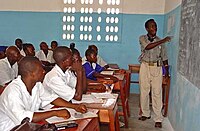
Photo from wikipedia
ABSTRACT Singapore is known as a high-performing country with high-quality teachers and is considered a model system for educational benchmarking. Still, many accolades for the system address teachers’ productivity in… Click to show full abstract
ABSTRACT Singapore is known as a high-performing country with high-quality teachers and is considered a model system for educational benchmarking. Still, many accolades for the system address teachers’ productivity in raising student achievement, which could reinforce a partial understanding of teacher quality in the system. Aiming at developing a more comprehensive and balanced understanding of the concept of teacher quality, this study explores the perspectives of two primary stakeholders in education in Singapore: the policymakers and the teachers. Although both groups value teachers’ role in students’ all-round development rather than mere academic achievement, they present different perspectives regarding the purpose and significance of teacher quality and its key factors. The policymakers perceive teacher quality as an apparatus for nation building and make it a target for bureaucratic control, whereas teachers consider the ‘self’ of individual teachers a key driver for quality teaching that caters to students. It is indicated that the current situation prioritizes the policymakers’ preference of productivity approach regarding teacher quality. However, this may overlook the significance of teachers’ selves and their efforts at care and student engagement, which could reduce teaching to a merely performative act.
Journal Title: Journal of Curriculum Studies
Year Published: 2020
Link to full text (if available)
Share on Social Media: Sign Up to like & get
recommendations!